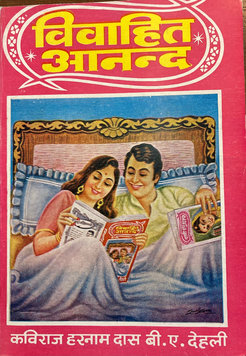Love and Labour in the City: Romantic Love and Delhi’s Workers, 1950s to the Present
Rukmini Barua

Working-class intimate lives in postcolonial India were profoundly affected by ideologies of anti-colonialism, nation-building, and economic liberalization, as they were by technological innovations that were increasingly embedded in personal spaces. This project is an ethnographically grounded history analyzing the ways in which working-class intimacy, romance, and conjugality are constituted and experienced at three interconnected levels—how the state, civil society, and social structures produce discourses of intimacy and the tensions that are embedded within; how vocabularies and modes of communication, including new forms of social media, orient ideologies and logistical repertoires of intimacy; and the role of the urban built environment and everyday rhythms of work and life in shaping intimate practices.
Scholarly perspectives on working-class intimacy have tended to view it either as a domain of “undisciplined desire” posing a challenge to normative constructions of domesticity and respectability or in terms of embourgeoisement, which is accompanied by adherence to or even mimicry of dominant upper caste and classed codes of feminine sexuality and conjugality. Furthermore, recent literature has argued that romantic love forms the foundation of a “powerful utopian vision” in symbolically inverting social hierarchies and affirming the primacy of the individual. Drawing on a range of archival, oral historical, ethnographic, and digital materials, this project counters these assumptions. Evidence from the contemporary Indian context, presented through this research, demonstrates how individual desire is increasingly framed not as opposition to caste- and kin-approved conjugal arrangements, but rather as a mode of integrating the family into the romantic ideal. In a similar vein, this study foregrounds everyday practices of digital intimacy among the urban working classes to suggest that instead of following a trajectory of embourgeoisement, configurations and repertoires of courtship and coupledom are produced in contingent and unstable ways at the intersections of caste, religion, and gender. Such practices contain, in suspended tension, unruly desires, social and cultural expectations of respectability, and attendant emotional investments in family and kin.
In addition to this project, I revisited my doctoral research on labor landscapes in the western Indian city of Ahmedabad through the 20th and 21st centuries, leading to the publication of a monograph and a number of articles. In the Shadow of the Mill: Workers’ Neighbourhoods in Ahmedabad, 1920s to the 2000s (Cambridge University Press, 2022) examines the experiences and negotiations of urban citizenship through the prism of everyday plebeian politics and property relations. In doing so, it draws attention to the transformation of the aesthetics and embodied practices of quotidian muscular politics in shaping social, legal, and affective claims on the city. Other publications that have stemmed from this research include a book chapter on the emotional dimensions of deindustrialization and a journal article on precarity and fantasy in working-class Ahmedabad.
Key References
